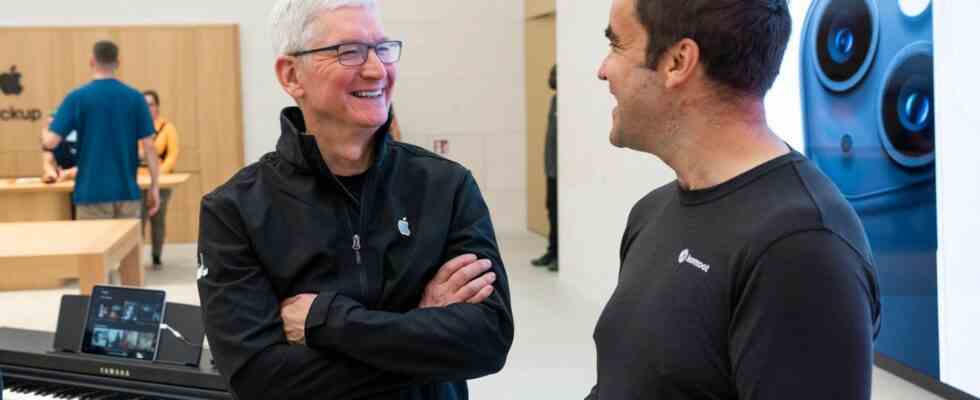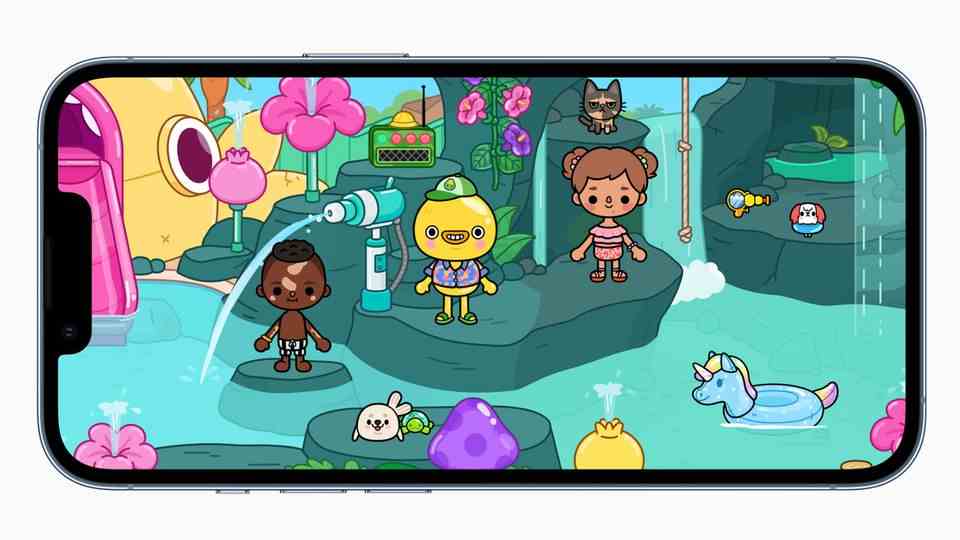During one of his rare visits to Germany, Apple CEO Tim Cook made a stopover in Berlin. When meeting with developers, he was enthusiastic. And found warm words for Berlin.
There is a lot of activity in the Apple Store on Rosenthaler Straße. Clerks in the typical blue and white shirts scurry around, polishing iPhones before the store opens and setting up the chic display. The employees do not yet know which distinguished visitors will honor them today. Two hours later, when Tim Cook entered the shop, which was now buzzing with customers, cheers erupted. The Apple boss himself is in Berlin. And wants to talk about apps.
The small, colorful tiles are not only the heart of our smartphone experience and turn iPhone and Co. into chat devices, navigation devices and video portals. They are also an increasingly important business segment. And not just for Apple. “You can express yourself about it and immediately offer it to a billion people around the world,” Cook enthuses in an interview with the star. “It’s unbelievable, it’s an economic miracle.”
Job Engine App Store
In fact, millions of developers work every day to be able to present new ideas, unimagined usage scenarios and exciting experiences to customers with apps. In Germany alone, 400,000 people are employed directly and indirectly through the App Store, Apple said in the spring.
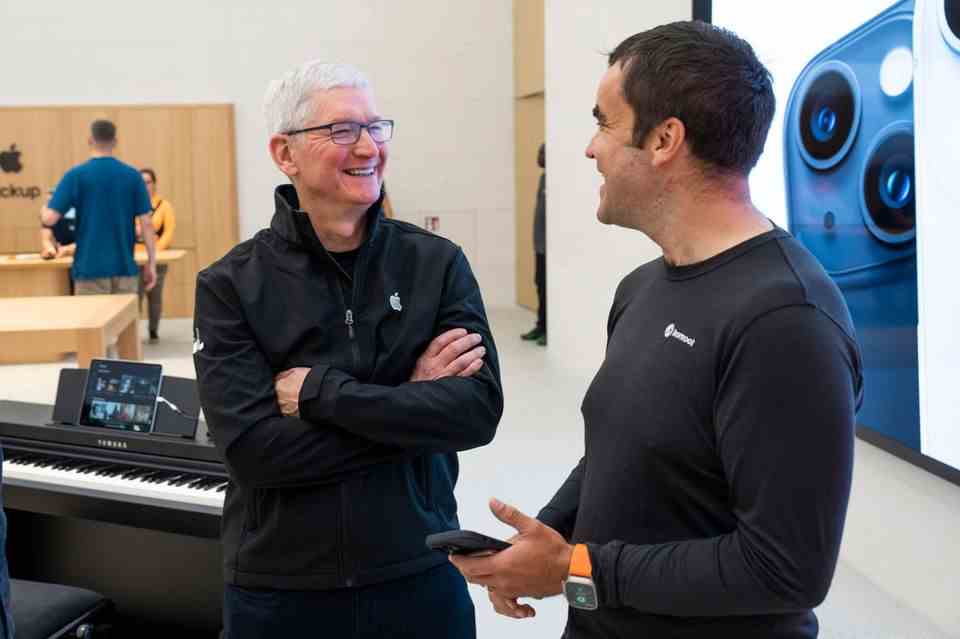
Markus Hallermann from the outdoor app Komoot was able to inspire hiking fan Tim Cook
© Apple / PR
Rasa Žiema, Jonas Gössling and Markus Hallermann are three of them. As representatives of their teams, they can present their apps Dogo, Flowkey and Komoot (in the same order as above) to the Apple boss. In the middle of the well-stocked Apple Store, Cook is shown how to learn the piano with Flowkey, the clever implementation of individual hiking routes is explained in Komoot and finally the dog Ninja shows him the tricks that master Dominik taught him with the help of Dogo.
Cook seems highly concentrated and eagerly listens to the somewhat excited developers’ explanations. And is always enthusiastic about the implementation of the successful apps. “You can choose the level of learning yourself?” he asks, for example, with the Flowkey piano app and wants to know which sports the outdoor app Komoot supports. “I wish I had the time,” the hiking fan shows his enthusiasm with a laugh. In the end, Ninja gets his neck scratched for his tricks.
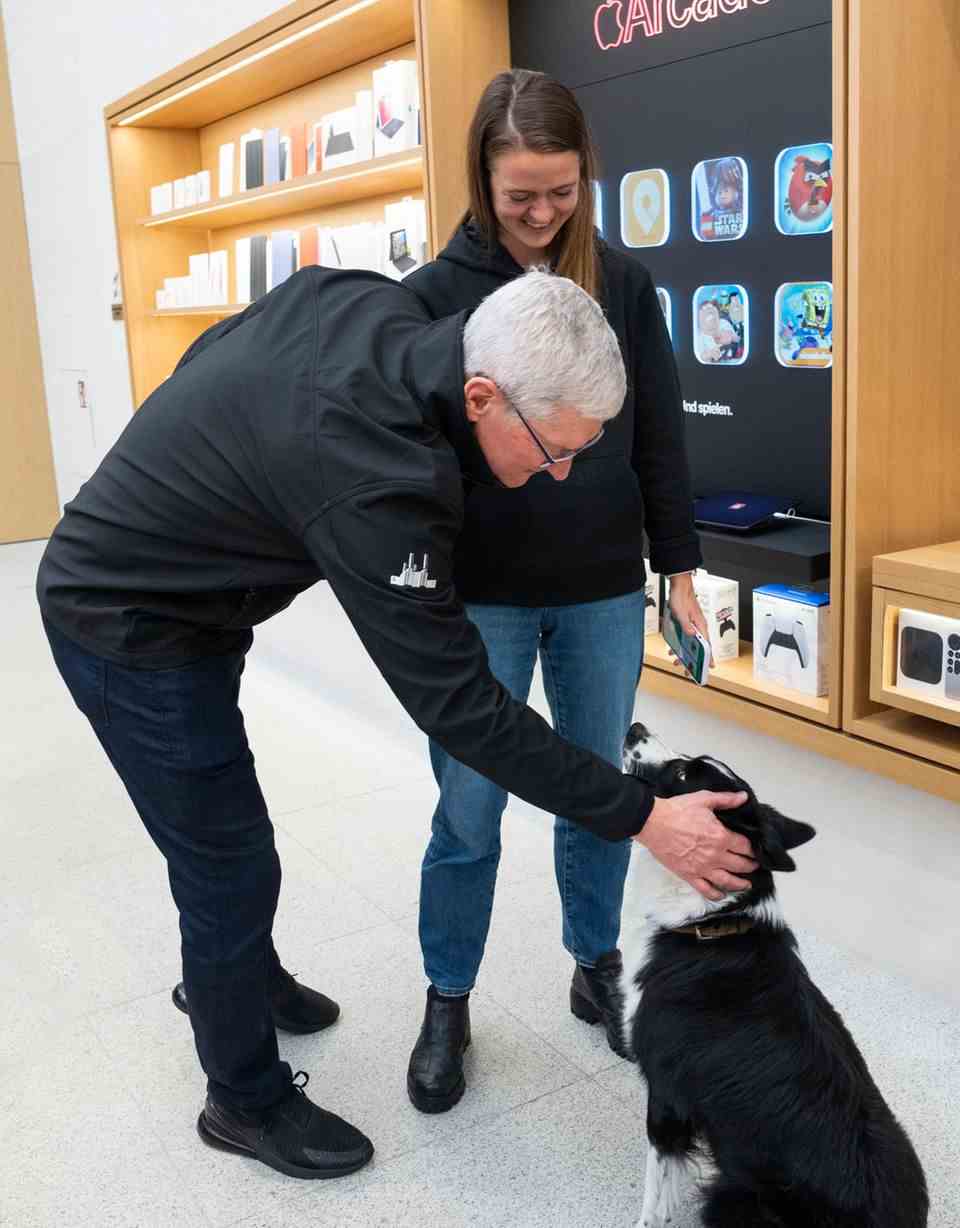
Dog Ninja showed Cook tricks
© Apple / PR
“Each of the apps has a unique use and there is something behind it that sparked their passion for bringing them into an app form,” explained the Apple boss afterwards, explaining his appreciation for the apps on display.
He himself no longer wants to do without the small icons. “There’s just so many and I use such a wide range of apps,” he explains. “I’m also very curious and I’m always trying new things. And I’m going to try some of the ones I discovered today too. I just can’t get through the day without using apps. That old slogan – ‘There’s an app for that ‘ — it’s very clearly a part of my life.”
Only apps made the smartphone great
The App Store was initially just an afterthought for Apple. When Steve Jobs presented the first iPhone in 2007, there was only one type of app: Apple’s. All other functions should be added via websites. It wasn’t until the successor model, the iPhone 3G, that Apple introduced the App Store in 2008 – and turned the smartphone into the all-round everyday companion we carry around with us today.
Today, the App Store is also big business for the group. Apple collects 30 percent for every purchase, be it one-off payments or subscriptions concluded via the apps. For smaller providers who make less than $1 million a year or have less than a million downloads, the fee is halved. Various services such as streaming providers also have to give up less.
It’s still a good deal for most developers, the three industry representatives unanimously report. “I was surprised at how much support we get from Apple,” reports Jonas Gössling. “I thought: You upload your app there and that’s it. But whether we have questions, billing or problems, Apple is really there for us all the time.”
Now it has to be said that Komoot, Flowkey and Dogo are receiving somewhat more intensive support. They are part of the “App Store Foundations Program”, in which Apple particularly promotes and supports selected app developers. For example, because they operate particularly promising and well-implemented apps. You will then receive targeted support and help with implementation and advertising.
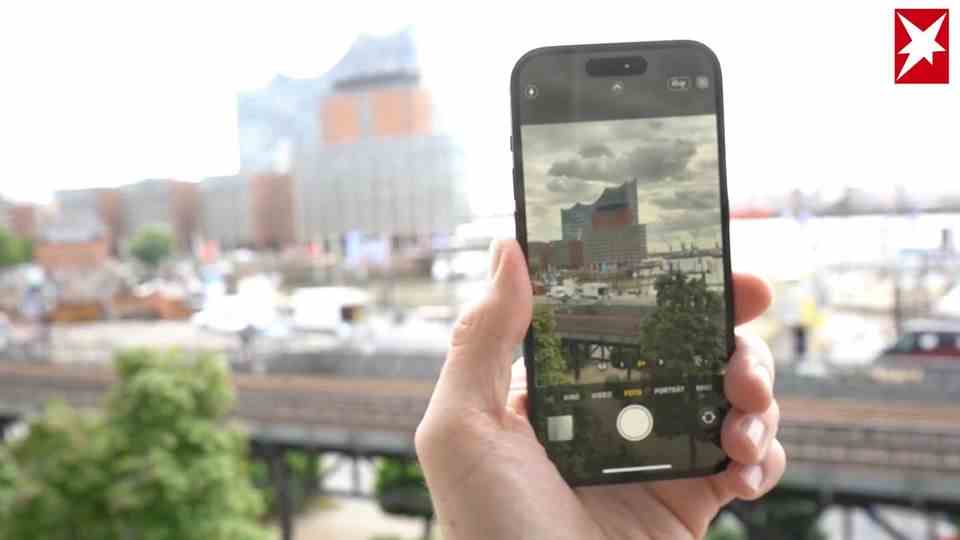
German apps are an export hit
The German developers are seen internationally as a case of success. According to the old principle of the world export champion, medium-sized app developers are also internationally successful. According to Apple, more than 75 percent of the income of German app developers comes from international business. Although there are no world hits like Instagram and Co., apps like Komoot, Dogo and Flowkey are also very popular with users worldwide.
This is also because Apple makes it easy to offer its app in other countries, the three developers report unanimously. “The biggest hurdle for us was building a community in other countries,” reports Markus Hallermann. Komoot is particularly popular because you can plan your routes along the scenic highlights. And they come from the users on site. On the other hand, offering the app itself was not a hurdle at all. “Apple does that automatically, including billing and taxes.”
Cook explains that Germany and especially Berlin is so interesting for app development with the atmosphere in the city. “Berlin is very diverse, just look around here in the store. It’s a very diverse group of people and they’re so lively,” he says happily about the group from the most diverse styles and backgrounds. “There are many young people here, a will to change the world. And all this together with access to venture capital – that’s where the right ingredients come together.”
The App Store is just one piece of the puzzle
Of course, the App Store is not Apple’s main business. Cook announced a few years ago that the service division – which, in addition to the App Store, also includes streaming offers such as Apple Music and Apple TV+ or the still young fitness subscription – will become one of the most important sources of income. However, Cook sees it primarily as a supplement.
“We have always stood for a combination of hardware and software,” he explains the strategy. “And we added the service component because we believe the magic happens when these things come together, in a way that only Apple can.”
But the side business is always worth it. The group does not provide precise information, but indirectly you can guess the size. Apple announced in January that more than 60 billion dollars had been paid out to developers in 2021. Considering the levy of between 15 and 30 percent, that would mean revenues of between 10 and 25 billion dollars last year, the truth is probably somewhere in between. For comparison: iPhone sales brought in $191 billion in the same period, and the iPad brought $31 billion into Apple’s coffers.
Tips for young developers
But Cook is also passionate about the idea of seeing app development as an opportunity. Earlier this week, he personally responded to a letter from a nine-year-old Indian developer to encourage her to keep going.
“I would tell them that there are no limits. And that they should follow their passion, find out what they want to contribute to our world. And then learn to code to express themselves in a way that is open to many people,” answered he asked what he would like to give to every young developer.
“In the end, programming is a simple language and one can express it in a way that can touch a billion people. How much more could we wish than to be able to make a contribution of such reach?”
In Berlin, this is definitely something that is lived: Before visiting the Apple Store, in the café in Berlin Mitte, two hip-looking developers talk in English about their experiences with Apple’s operating system, the challenge of building a graphical interface using only program code. “I want to start my own company someday,” explains one of them. “App development is just so satisfying. It feels like anything is possible if you can make it happen. It’s easier with coding than in real life.”

